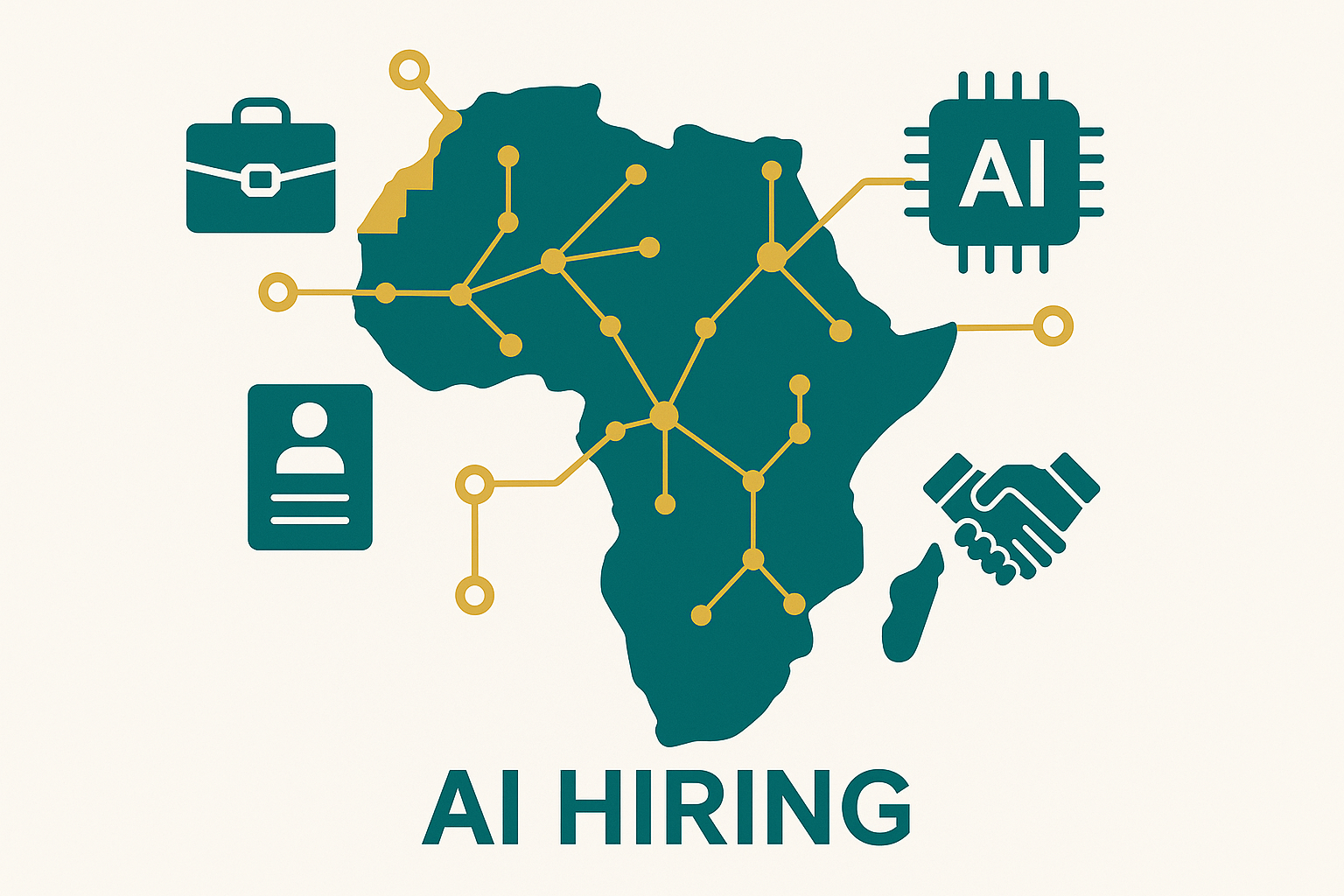In a strategic move for African HR tech, Jobzyn AI hiring platform has closed a pre-seed funding round led by pan-African venture capital firm Janngo Capital, with participation from Digital Africa and several angel investors.
While the exact figure of the round was not disclosed, the investment marks a clear signal: the region’s startup ecosystem is doubling down on solving hiring inefficiencies with AI.
The Problem Jobzyn Aims to Solve
Across Africa and the Middle East & North Africa (MENA) region, job markets are strained by several interconnected problems: thousands of job seekers chasing minimal formal opportunities; recruiters flooded with applications, many of which are ill-fitted; a lack of transparency in employer culture, compensation, and soft skills expectations; and a disconnect between university education and post-graduation outcomes.
Moreover, youth and women are especially disadvantaged. Women often represent only about 20% of the formal workforce in many African countries.
How the Jobzyn AI Hiring Platform Works
Founded in 2023 by Simo Zizi (CEO) and Abdelbassite Badou, Jobzyn builds an AI-driven recruiting & matching platform with multiple value propositions:
- Automated candidate matching: uses AI tools to filter high volumes of applications and identify those most likely to fit, reducing time and cost for recruiters.
- Soft-skill assessment pre-interview: Beyond diplomas and past jobs, Jobzyn evaluates non-technical, behavioural skills before moving on to interviews. TechCabal
- Employer transparency tools: job candidates can access video testimonials from current or past employees, see “office culture” through photos or descriptions, and understand leadership or management vision. This helps reduce the mismatch between candidate expectations and the work environment.
- Career Centre/university integrations: partnering with universities to deploy white-label “career centre” tools so that students can see job offers, track employment outcomes (graduates’ rates of finding jobs, average salaries, etc.), and improve the feedback loop between education and employment. Universities such as INSEA, ESI, HEM, and HEC Rabat are among the early adopters.
Additionally, Jobzyn already counts several clients among Morocco’s and internationally: Deloitte, PwC, Glovo, Maroc Telecom, Inwi, Intelcia, and TGCC.
Investor & Funding Context
- Lead investor: Janngo Capital, a pan-African VC with a strong gender-lens investment mandate. One of their key goals is to support tech firms that create job opportunities for young people and women.
- They manage one of the continent’s most significant funds, focusing on gender equality in the tech sector.
Janngo’s second fund reached a final closing at $78 million in October 2024.
Though the precise sum Jobzyn raised was not made public, it is stated that the funds will be used to:
- Accelerate product development (better matching algorithms, soft-skills tools, transparency features)
- Expand its reach into other African markets and the MENA region.
Numbers, Data, and Benchmarks
- Women currently make up around 20% of the formal workforce in many African markets; Jobzyn’s model sees inclusion of women as a direct benefit.
- Janngo’s investment reflects a broader trend: the need for 3-30 million new jobs annually in Africa by 2050 to keep pace with population growth. Currently, only around 3 million new jobs are created annually across the country.
- Jobzyn’s university customers already include at least four leading institutions: INSEA, ESI, HEM, and HEC Rabat.
Implications of the fund
Jobzyn’s funding and approach have several implications—some promising, some cautionary.
- A shift toward more efficient recruitment: By automating matching and soft skills evaluation, Jobzyn reduces the time wasted on unqualified applicants. For large firms inundated with thousands of resumes, this could save significant HR resources.
- Transparency as recruiting leverage: As younger generations (especially Gen Z) increasingly value workplace environment, leadership, ethics, culture, Jobzyn’s features (employee testimonials, culture display, etc.) could become key differentiators for employers. Platforms and employers that remain opaque risk losing out on talent.
- Education-employment feedback loops: By integrating with universities to track graduate outcomes, Jobzyn helps close the gap between what schools teach and what jobs require. This has the potential to enhance curriculum relevance, mitigate skills mismatches, and even inform policy on education and training.
- Improvement in inclusion and equity: With special attention to women and youth, the model may help reduce gender gaps in employment and enable broader economic participation. But achieving that depends on how Jobzyn handles algorithmic bias, equitable access, and regional/digital infrastructure differences.
- Competitive pressure on global incumbents: Platforms like LinkedIn, Indeed, and local job boards may face pressure to offer more localised, transparent, and AI-enabled services. Jobzyn, being local and built with regional context, may have advantages over global players in terms of language, cultural norms, regulatory compliance, and trust.
- Risks & ethical challenges
- If AI matching and assessment tools are opaque, there is a risk of unfair rejection or bias. What if soft-skill assessments disadvantage people from non-urban or less privileged backgrounds?
- Digital divide: In regions with poorer internet access, limited device availability, or low digital literacy, Jobzyn’s tools may be less accessible.
- Regulatory issues, including data protection, candidate rights, and transparency in algorithmic decision-making, will become more critical.

What’s Next for Jobzyn AI Hiring and Expansion
Jobzyn is likely to follow several paths as it moves forward:
- Geographical expansion: Targeting more countries in Sub-Saharan Africa and MENA, adapting to local languages (Arabic, French, English), regulatory environments, and employer norms.
- Feature deepening: Enhancing AI models for matching, improving soft-skill evaluation, possibly integrating more objective assessments (tests, peer reviews, endorsements), richer feedback to candidates, and more employer insights (diversity, policies, pay scales).
- Stronger university & policy partnerships: Expanding the “Career Centre” offering to more universities, possibly working with governments or NGOs to help job seekers, especially in underserved or rural regions, and shaping policy around employability data.
- Focus on fairness, transparency & ethics: As usage scales up, Jobzyn will need to establish mechanisms to audit bias, let candidates understand why they are rejected or ranked, and ensure equitable access (including internet access and device compatibility).
- Potential monetisation paths: These could include subscriptions from employers, premium features such as advanced employer branding, or offering data analytics services (e.g., employer benchmarking, salary data). Universities might pay for career centre services.
- Competition & collaboration landscape: Existing global platforms may adapt features; local incumbents may try to catch up. Jobzyn might also become an acquisition target or partner with larger HR tech firms.
Broader Context & What the Data Tells Us
It is helpful to place Jobzyn in the broader currents rippling across Africa:
- A recent academic study (Anas Zidane, University Mohammed V, Rabat) found that digital recruitment platforms significantly reduce the time-to-employment for graduates in Morocco and improve the quality of matches. But this effect is uneven: regions with weaker digital infrastructure or low digital literacy benefit less.
- According to “How Digital and AI Technologies Are Revolutionising Africa’s Employment Landscape”, tens to hundreds of millions of young Africans are expected to enter or try engaging with formal work; many traditional systems are not equipped to absorb or match them efficiently. Automation tools, platform matching, transparency, and skills training are recurring themes.
Conclusion
Jobzyn’s pre-seed raise is more than just another startup win: it is a node in the evolving infrastructure of Africa’s job market. If executed well, it may help shift how hiring is done—making it faster, fairer, more transparent, and more attuned to the needs of youth, women, graduates, and employers alike. But the devil lies in the execution: handling bias, ensuring access, scaling ethically, and staying locally relevant across diverse markets.
For Morocco’s tech ecosystem, Jobzyn represents a proof point that local innovators can build solutions not just for domestic markets but across Africa and the MENA region—and attract serious investment while doing so. For candidates and companies, Jobzyn offers promise: less guesswork, more visibility, and potentially a smoother path from education to employment.

